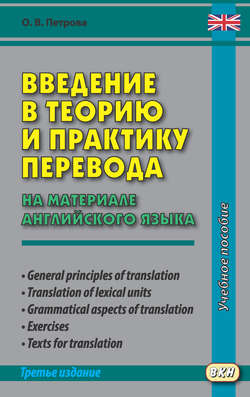Введение в теорию и практику перевода (на материале английского языка)

Реклама. ООО «ЛитРес», ИНН: 7719571260.
Оглавление
Ольга Петрова. Введение в теорию и практику перевода (на материале английского языка)
General principles of translation
Translation of lexical units
Types of correlation between words in source language and target language
Context and its role in translation
Translation of words having no correspondence in TL
Translation of phrases
Lexical transformations
Grammatical aspects of translation
Grammatical transformations
Translation of specifically English grammatical forms and constructions
Exercises
Texts for translation
Text 1. Matching the man and the right job. Art Buchwald
Text 2. Talking like your parents? You could do worse. John Rosemond
Text 3. Investing in paper. Art Buchwald
Text 4. In the bank[6] Stephen Leacock
Text 5. Indomitable little man[7] Joseph North
Text 6. Congress – what is it?[8] D.C.Coyle
Text 7. Introduction to the United Nations[9] Peter Lyon
Text 8. Is the Monroe Doctrine dead?[10]
Text 9. The great debate[11]
Text 10
Alexander Clackson [13]
Abbreviations
Fiction and dictionaries cited
Отрывок из книги
Translation is a process and the result of turning a text from one language into another, which means expressing the same by the signs of a different language. Bearing in mind that every sign has two planes (plane of expression and plane of content) the essence of translation could be described as changing the elements of the plane of expression while the plane of content remains constant.
The language of the original text is called "source language", the language into which the text is translated is called "target language" (the corresponding Russian terms are "исходный язык" and "переводящий язык").
.....
First of all it is necessary to know that the formula "What will you have?" has a conventional meaning of an invitation to choose some liquor. Besides one should know what "Prohibition" is meant here (the eighteenth amendment to the US Constitution) not to translate it as "запрет". Only in this case there may appear a correct version:
It is also most essential to remember that nations speaking different languages have different experience, and things naturally known to one nation are quite unknown to another. To see it one may try to translate into English the title of the film "Петровка, 38", making it as informative for Englishmen or Americans as it is for us because we know perfectly well what office is situated there.
.....